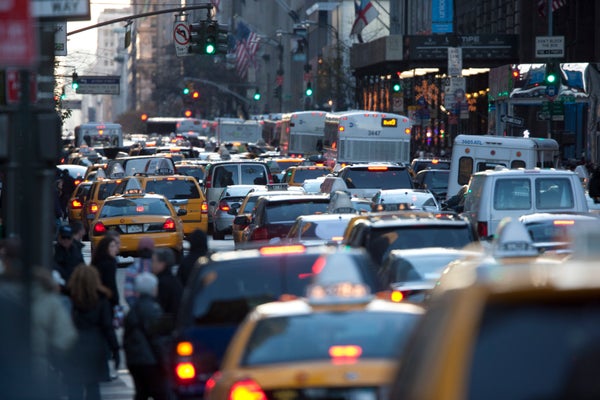
VW Emissions Cheating Scandal Increased Children’s Pollution Exposure
Increased air pollution impacted low birth weights and asthma attacks, a federal economist says

The Federal Reserve Bank of Chicago is investigating how the Volkswagen AG emissions cheating scandal affected health outcomes in the United States.
And the findings are grim: A new working paper from the bank found that the addition of just one cheating diesel car per 1,000 cars increased rates of low birth weight and acute asthma attacks among children by 1.9% and 8.0%, respectively.
“People tend to avoid pollution. So if they know about the pollution, they will not go out and experience it,” said Chicago Fed economist Diane Alexander. “But with the Volkswagen cheating cars, essentially you had this situation where these pollution-generating machines were driving all around the U.S., and no one knew about it.”
If you're enjoying this article, consider supporting our award-winning journalism by subscribing. By purchasing a subscription you are helping to ensure the future of impactful stories about the discoveries and ideas shaping our world today.
It may seem odd for a federal bank to be probing the emissions scandal. But the Chicago Fed maintains a small team of researchers who study various issues affecting the economy, including public health, which accounts for nearly 20% of the nation’s gross domestic product.
Alexander is leading the charge on the Volkswagen work in conjunction with Northwestern University assistant economics professor Hannes Schwandt.
“When the Volkswagen scandal came along, the cynical economist in me was like, ’This is a really terrible thing to happen. But the silver lining is that we can [study it],’” said Alexander, who obtained a doctorate in economics from Princeton University before joining the bank in 2016.
The Volkswagen emissions cheating scandal—also known as Dieselgate—first began to unfold in September 2015, when a team of scientists at West Virginia University discovered that the German automaker had installed defeat devices on its “clean diesel” models.
The software activated the cars’ emissions controls in the laboratory. But on the road, the cars released up to 40 times more nitrogen oxides than U.S. regulations allowed.
It was eventually revealed that Volkswagen had sold 11 million cheating diesel cars worldwide, including 600,000 in the United States. Multiple governments imposed billions of dollars in fines on the automaker, and several top executives were forced to resign from the company.
The working paper from the Chicago Fed relied on detailed data on vehicle registrations and birth outcomes in the United States from 2008 to 2015. The researchers compared the cheating diesel cars to a “placebo” group of the same cars with gasoline-powered engines.
“I was kind of surprised at the beginning about how strong the results were,” Alexander said.
“But when I started digging deeper to figure out exactly how much these cheating cars were cheating, then it became less surprising that we were able to pick up these effects,” she added.
Alexander plans to present the working paper, which has not yet been peer-reviewed, at the National Bureau of Economic Research Summer Institute next week.
So far, the paper has gotten a positive reception.
“I think it’s a really cool paper. They used cool data. Their results are really believable,” said Claudia Persico, a professor at American University who has studied the effect of tailpipe pollution on children’s health.
Persico said the findings dovetail with her previous research, which has highlighted that tailpipe pollution affects children’s test scores, behavior and absences from school.
Alex Hollingsworth, a professor at Indiana University, Bloomington, who specializes in health economics, also praised the paper.
“Typically when we study the effect of vehicle emissions on health, it’s difficult to break the fundamental problem that people who live by highways or point sources of pollution are different from people that live far away,” Hollingsworth said. “So the fact that people were accidentally exposing themselves to this, it’s a very neat natural experiment.”
Still, Hollingsworth said the authors could refine the paper before getting it peer-reviewed and published in a scientific journal. He specifically recommended that they quantify the total tons of NOx emissions and vehicle miles traveled of the cheating diesel cars.